The future of petroleum engineering looks grim thanks to renewable energy, but fossil fuels aren’t going to disappear completely.
Let’s dive into 11 things about petroleum engineering that’ll give us a better grip on the situation.

Important Note: Fossil fuels include coal, crude oil, and natural gas, all formed from buried plant and animal fossils millions of years ago. Petroleum engineers are the folks who extract these fuels from the Earth for our use.
#1 Riding the green energy wave
People are waking up to the nasty pollution caused by burning fossil fuels, not to mention how it’s speeding up climate change.
Take California, for example – they’re aiming for 100% clean electric power by 2045, meaning they’ll rely entirely on zero-emission energy sources. You can bet other states will jump on the bandwagon too.
According to the U.S. Department of Energy, electric vehicles (EVs) saved 323 million gallons of gasoline in 2018. That’s only 0.25% of all the gas used in the U.S. that year, but hey, it’s a start.
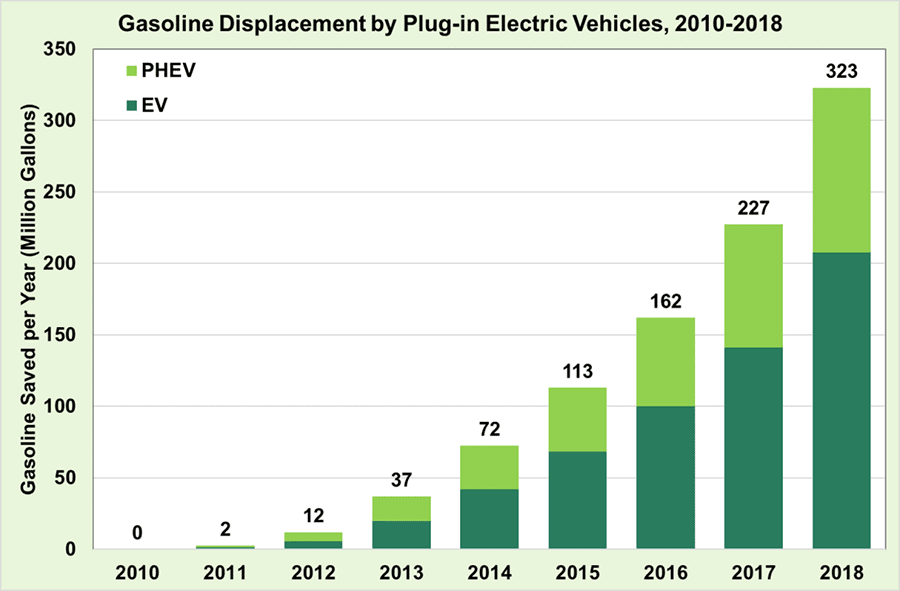
As an electrical engineer in California, I can literally feel the shift happening. Every month, I’m swamped with more renewable energy and battery design projects from both private and public clients.
Also, you’ve probably noticed more and more electric cars cruising around every day, right? This skyrocketing demand is putting some serious pressure on the fossil fuel industry. But don’t think companies like British Petroleum (BP) are just kicking back and watching it happen. They’re stepping up and aiming for net-zero carbon emissions by 2050.
#2 The hard truth about kicking the fossil fuel habit
We can’t just snap our fingers and switch from fossil fuels to renewable energy sources – our infrastructure wouldn’t be able to handle it.
In the past 30 years though, we’ve weaned off the more destructive fossil fuel, coal. Instead, we’ve used more natural gas, a cleaner-burning fossil fuel. So it’s a gradual transition.
But there’s a catch. Developing countries like India and China have booming middle classes that want to hit the road, and electric cars just aren’t a viable option for them. Plus, petroleum is cheaper and easier to deploy at scale, especially when regulations are lax.
Long story short: this is a worldwide team effort.
#3 The rise of renewables and batteries

As technology keeps getting better, renewable energy sources are becoming more attractive, especially with increasing energy efficiency and dropping prices.
Just look at California’s bold goal for 2045 – it’s pushing companies to keep innovating and improving their tech. Check out these U.S. Energy Information graphs that give us a glimpse into the future.
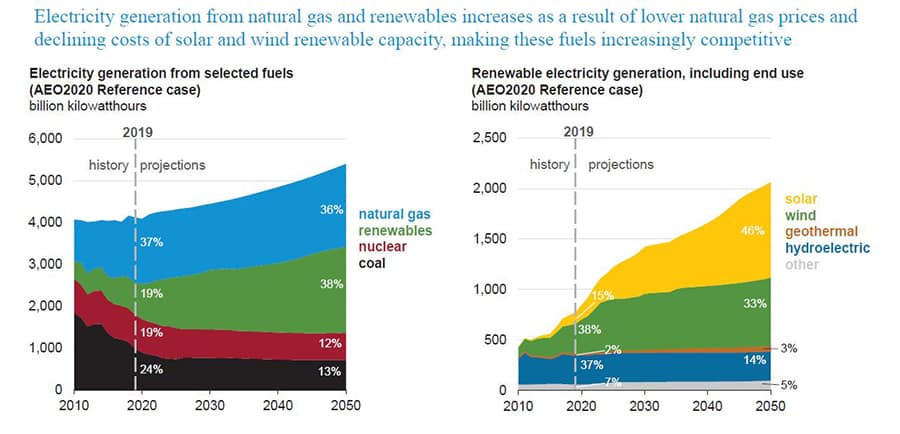
The writing’s on the wall for the fossil fuel industry, and every tech breakthrough is another nail in the coffin.
Take coal versus renewables, for instance. The graph below from the U.S. Energy Information Administration shows how the two are on a collision course in terms of consumption.
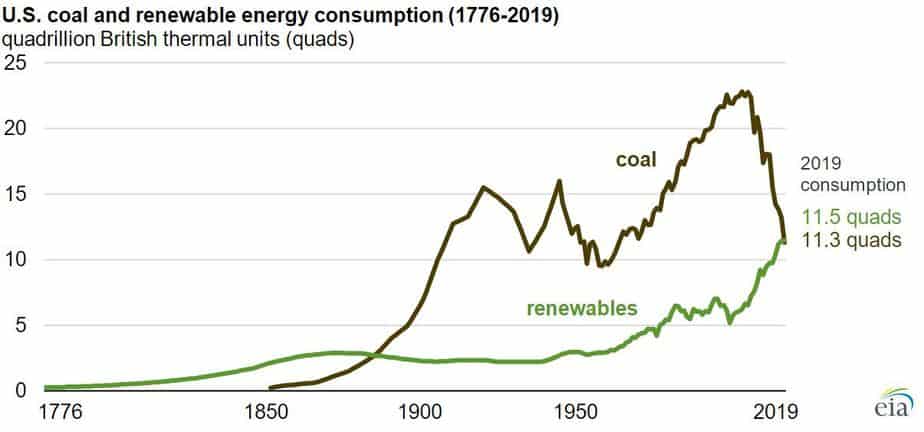
#4 The new kids on the block and their take on fossil fuels
Millennials and Gen Zers were raised with a pretty negative view of fossil fuels. That’s gonna make a lot of them think twice about joining the petroleum industry.
No one wants to be known as a “Climate Change” enabler. Imagine the hashtag #ClimateDestroyer with your name tagged on it. Not a good look.
Now, let’s be real – this level of hate isn’t totally fair. After all, fossil fuels were a stepping stone to renewable energy. And even today, they’re helping renewables get off the ground.
Hostile work environments of petroleum engineers
Working in the petroleum industry is probably gonna get rougher. The easy pickings are gone, so engineers will need to venture into more remote and harsh environments to extract fossil fuels. We’re talking the middle of the ocean or freezing tundra.
I don’t see this being super attractive to the younger crowd, especially when they could be cozied up in a comfy office with climate control instead.
#5 Existing reliance on fossil fuels
Let’s face it – we’re pretty much addicted to fossil fuels. They’ve got a ton of momentum behind them.
Just check out the transportation industry. Here’s a list of vehicles that still guzzle oil like there’s no tomorrow:
- Airliners
- Private planes
- Boats
- Cruise ships
- Cargo ships
- Military equipment
- Trains
Fossil fuels are the ideal mobile fuel when you think about:
- Energy density
- Refill time
- Initial production cost
- Existing global infrastructure
Scaling renewables to match petroleum is gonna take decades. And the demand for fossil fuels in the air industry and for heating isn’t going away anytime soon.
Reliance on plastics
Even if we somehow weaned all modes of transportation off fossil fuels, we’d still need plastic. Next time you go shopping, take a gander at all the plastic you lug home with you. Then, peek around your own house – plastic is everywhere!
Most people don’t realize that most plastics come from the petrochemical industry. So, unless we find alternatives, we’ll still need fossil fuels. But hey, there’s a ton of pressure to develop biodegradable solutions to replace plastic.
The bottom line is, despite what some may think, fossil fuels still rule the market. Check out this graph from the U.S. Energy Information Administration to see the demand.
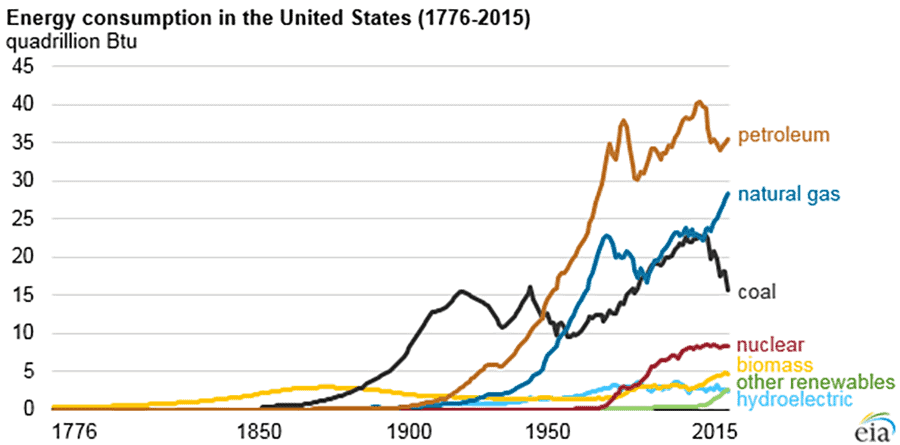
#6 The rollercoaster ride of the petroleum industry
The oil industry is like a wild rollercoaster, with major ups and downs every 5 to 10 years. Before the 2020 COVID-19 pandemic, the last big dip was between 2014 and 2017.
With each downturn, oil companies slash overhead costs by cutting staff. Meanwhile, oil supply often stays ahead of demand, causing oil prices to plummet, and fewer engineers get hired.
Nowadays, as the market for oil and gas gradually shrinks, companies are in maintenance mode. They’re squeezing the most out of current production while keeping their wallets closed for exploration and innovation. This also means less demand for engineers.
In a world where we crave stability, this wild ride might be too much for some engineers—especially those who just want to earn a steady paycheck and pay the bills without any drama.
#7 The oil industry’s uphill battle

Today’s new challenges in the oil industry paint a grim picture for petroleum engineering.
First, future oil extraction will only get tougher. We’ve already tapped into the easy-to-find oil on Earth, so now we’ll have to venture deeper and farther to get our hands on new fossil fuel sources. This demands greater innovation and exploration, which means higher costs.
These difficulties are turning into another victory for renewable energy, particularly as the cost of renewables keeps dropping.
Second, new regulations on oil extraction keep popping up every year. On a level playing field, fossil fuels would be cheaper than renewables. However, with regulations against fossil fuels and subsidies for renewables, the tables have turned.
Strict laws have made fossil fuel extraction pricey. Drilling today requires extra caution and meticulous planning. In many cases, it’s simply not worth the cost to drill for oil.
#8 The baby boomer exodus
A significant portion of petroleum engineers are baby boomers on the brink of retirement, or they’ll be forced to retire due to economic downturns.
Even though we still rely heavily on fossil fuels, we’re going to need a new generation of highly-skilled engineers to fill the gap. This will be a challenge, as valuable knowledge and best practices risk being lost with the retiring engineers.
Given the many new obstacles facing the industry, this brain drain could further hamstring the field.
#9 The beauty of versatile engineering degrees
These days, a degree doesn’t lock you into one specific career path. That’s why I’d suggest getting a non-petroleum engineering degree.
Consider a mechanical engineering degree, for example. You can still work in the petroleum industry with that degree—I know a bunch of folks who’ve done just that, and they’re all for it.
Sure, you could argue that plenty of petroleum engineers have switched industries. But why make things harder for yourself? There are loads of other engineering degrees that offer way more flexibility.
Take the mechanical engineering degree again. It’s incredibly versatile and opens doors to nearly every industry. In contrast, a petroleum degree ties you to one specific industry, as the name suggests.
#10 Exciting petroleum engineering applications beyond oil and gas
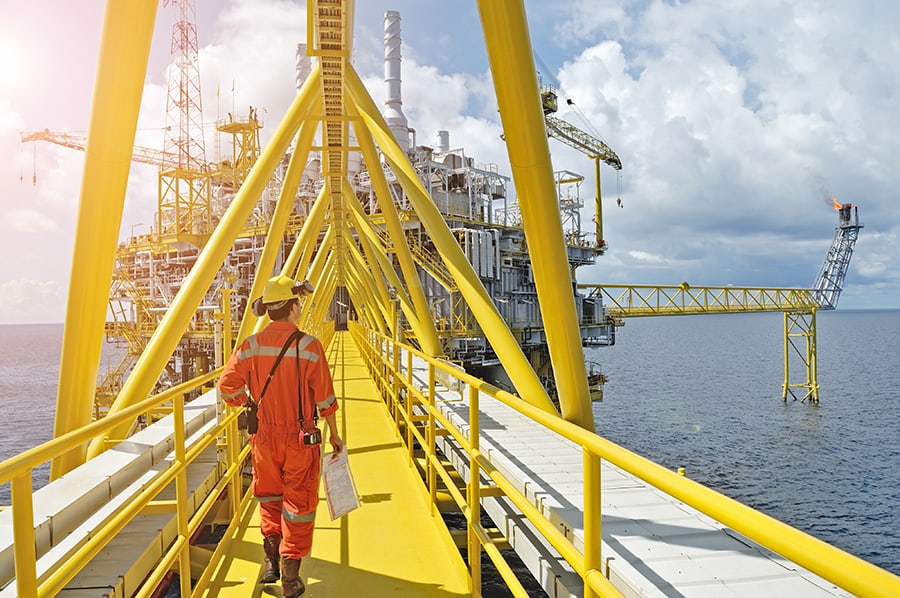
You might think that a petroleum engineering degree is pretty narrow in focus, but you’d be surprised to know that drilling applications actually extend beyond fossil fuels. One alternative application that’s gaining traction is geothermal energy—a renewable and eco-friendly source of power.

Important Note: Geothermal energy harnesses the Earth’s internal heat. In some parts of our planet, magma pools build up and can be used to heat water. This heated water turns into steam, which spins a turbine, and voila! A connected generator produces electricity.
In this process, water is pumped underground onto hot rocks to create steam, and guess who can manage this work? That’s right—petroleum engineers! They have the expertise in geology, drilling, and fluid flow that’s needed for the job.
The geothermal energy industry is still untapped, with a dazzling future ahead. We’re far from maximizing this amazing energy source.
#11 Cutting-edge tech advancements in the oil and gas industry
As renewable energy gains momentum, new technology is also making drilling and production in the fossil fuel industry cheaper and cleaner. This is fantastic news, especially since developing nations will soon rely heavily on fossil fuels.
Without a global initiative in place, it’s hard to imagine these nations not taking advantage of fossil fuels. Let’s not forget that all first-world countries once leveraged them during their industrial age. It would be hypocritical to “ban” fossil fuels without offering viable alternatives.
In a nutshell, new tech will prolong our dependence on fossil fuels while creating jobs in various corners of the world.
“What’s the future of petroleum engineering?” wrap up
Although some may claim the sky is falling, petroleum engineering isn’t disappearing anytime soon. However, I don’t foresee another massive oil boom where everyone gets insanely rich. The demand for fossil fuels will inevitably decline over time.
That’s why I wouldn’t recommend diving headfirst into this career unless you’re truly passionate about the work, have top-notch grades from a prestigious school, and are cool with a historically unstable career path.
Instead, consider pursuing a mechanical or chemical engineering degree. You can still dabble in petroleum engineering jobs, but you’ll also have a world of other opportunities at your fingertips.
What’s the future of petroleum engineering in your eyes? Do you think fossil fuels will ever be completely phased out?
